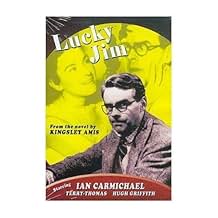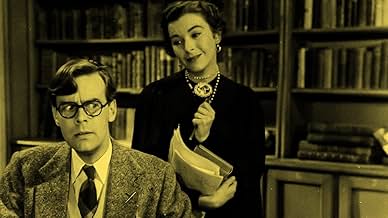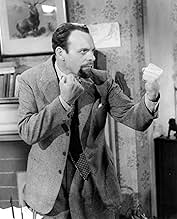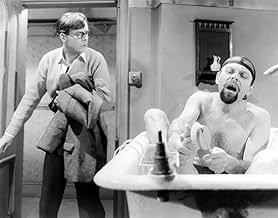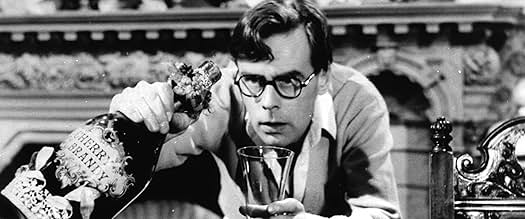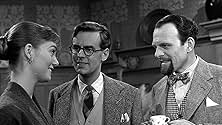Jim Dixon struggles with university work, Professor Welch's boring behavior, and his neurotic friend Margaret Peel. His misery is further complicated by his son Bertrand and companion Christ... Read allJim Dixon struggles with university work, Professor Welch's boring behavior, and his neurotic friend Margaret Peel. His misery is further complicated by his son Bertrand and companion Christine Callaghan.Jim Dixon struggles with university work, Professor Welch's boring behavior, and his neurotic friend Margaret Peel. His misery is further complicated by his son Bertrand and companion Christine Callaghan.
- Director
- Writers
- Stars
John Welsh
- The Principal
- (as John Welch)
Henry B. Longhurst
- Professor Hutchinson
- (as Henry Longhurst)
- Director
- Writers
- All cast & crew
- Production, box office & more at IMDbPro
6.0805
1
2
3
4
5
6
7
8
9
10
Featured reviews
Mildly Funny but Somewhat Broad Version of the Amis Classic
Planned as a follow-up to PRIVATE'S PROGRESS (1956), the Boulting Brothers' version of the Kingsley Amis classic substitutes physical comedy for much of the novel's satire. Ian Carmichael plays Jim Dixon as an amiable dolt, well-meaning but hopelessly lost in a faculty world of would-be Oxbridge dons. Professor Welch (Hugh Griffith) comes across as forgetful yet obsessive; his wife (Jean Anderson) as an incorrigible snob; and their son Bertram (Terry-Thomas) as a pretentious layabout. They inhabit a world of the past, dominated by images of 'Merrie England' - an idealized version of history that in Dixon's view never existed. By contrast Dixon tries to inspire his learners by encouraging them to speculate on alternative versions of the past. The film's enduring theme ("Oh, Lucky Jim!") by John Addison offers an ironic counterpoint to many of the protagonists' misadventures; he is clearly NOT lucky in many of the things he does - for example, bringing a bulldog into the Welches' front room to disrupt their evening concert, or creating total anarchy in the middle of a procession dedicated to the new Chancellor's (Clive Morton's) inauguration. Carmichael possesses a certain degree of comic talent as the innocent lost in a world of pseudo-sophisticates, but the Boultings' attempt to turn him into a Keatonesque figure, complete with a repertoire of India-rubber facial expressions, falls rather flat. The film ends happily with Dixon getting the girl (Sharon Acker), but only after a chase-sequence involving a series of unconvincing studio shots that seems out of place in terms of the film as a whole. It's nice to see him get the better of the Welch family, but we don't get the sense that he is in any proud of his grammar school education which (in terms of the novel at least) is particularly important at the time of the film's original release, when redbrick universities were offering greater opportunities to people from all social backgrounds to advance themselves. The Welch family might not like these social upstarts invading their intellectual space but, in terms of British history as a whole, they were the future while the Welches represented the past.
Academia and stuffiness comes under the Boulting's microscope.
Lucky Jim is directed by John Boulting and adapted from the Kingsley Amis novel of the same name. It stars Ian Carmichael, Terry-Thomas, Hugh Griffith, Sharon Acker and Jean Anderson.
A Redbrick university In Britain's New Elizabethan Age: Here Are Moulded The Intellectual Drakes And Raleighs Of Tomorrow-Fearless, Independent- -
And State Supported!
Enter Carmichael's accident prone Jim Dixon, who in order to keep his job at the University has to do the bidding for Griffith's dull Professor Welch. Worse still, maybe, is having to spend time with his boorish family, especially the Son, pompous show off Bertrand (Thomas). Salvation may come in the form of Bertrand's companion, though, Christine Callaghan (Acker)?
I haven't read the Amis novel this is based on, so can't have frame of reference there. By all accounts it's very different, and staunch Amis supporters are very dismissive of the Boulting movie. The film itself is hardly prime Boullting Brothers, who would produce British classics such as Brighton Rock and I'm All Right Jack, but it has a number of funny scenes whilst also being nicely flecked with satirical flavouring. Carmichael attacks the lead role with gusto and comic affability, while "scary eyebrows" Griffith and Terry-Thomas provide good comedy footings for Carmichael to work from. The ladies are pretty and effective enough, without really doing anything any other British actress of the time couldn't have done, but all told it's a well acted and genial time filler for the undemanding. 6.5/10
A Redbrick university In Britain's New Elizabethan Age: Here Are Moulded The Intellectual Drakes And Raleighs Of Tomorrow-Fearless, Independent- -
And State Supported!
Enter Carmichael's accident prone Jim Dixon, who in order to keep his job at the University has to do the bidding for Griffith's dull Professor Welch. Worse still, maybe, is having to spend time with his boorish family, especially the Son, pompous show off Bertrand (Thomas). Salvation may come in the form of Bertrand's companion, though, Christine Callaghan (Acker)?
I haven't read the Amis novel this is based on, so can't have frame of reference there. By all accounts it's very different, and staunch Amis supporters are very dismissive of the Boulting movie. The film itself is hardly prime Boullting Brothers, who would produce British classics such as Brighton Rock and I'm All Right Jack, but it has a number of funny scenes whilst also being nicely flecked with satirical flavouring. Carmichael attacks the lead role with gusto and comic affability, while "scary eyebrows" Griffith and Terry-Thomas provide good comedy footings for Carmichael to work from. The ladies are pretty and effective enough, without really doing anything any other British actress of the time couldn't have done, but all told it's a well acted and genial time filler for the undemanding. 6.5/10
Flawed but fun.
Fans of Kingsley Amis's brilliant novel might with justification hate this adaptation, but taken on its own terms, it is an enjoyable slice of 'fifties British comedy. While the novel's bite may have been lost, the movie's troubled production history (a few weeks into the filming, the original director, Ealing's Charles Crichton, was replaced) fails to show on the finished film.
Ian Charmichael is at his best in this movie. The combination of a (realistic) Northern accent, plus a slightly harder edged characterisation, helps distance him from his usual 'silly ass' image. Perhaps he isn't the Dixon of the book, but it is a fair attempt. A first rate cast adds to the fun, in particular a small but perfectly formed cameo by Terry-Thomas steals the movie.
The final chase is, as been noted, the movie's weakest link (it seems to come out of nowhere and does not fit in with the rest of the film) and is it fair from being the best Amiss adaptation (that honour belongs to the wonderful 'Only Two Can Play'). But despite these flaws, it remains a watch able enough movie.
Ian Charmichael is at his best in this movie. The combination of a (realistic) Northern accent, plus a slightly harder edged characterisation, helps distance him from his usual 'silly ass' image. Perhaps he isn't the Dixon of the book, but it is a fair attempt. A first rate cast adds to the fun, in particular a small but perfectly formed cameo by Terry-Thomas steals the movie.
The final chase is, as been noted, the movie's weakest link (it seems to come out of nowhere and does not fit in with the rest of the film) and is it fair from being the best Amiss adaptation (that honour belongs to the wonderful 'Only Two Can Play'). But despite these flaws, it remains a watch able enough movie.
Lucky education
Kingsley Amis might not had liked the adaptation of his novel set in a redbrick university in 1950s Britain when university education started to expand and took on some working class students. The Boulting brothers film comes across a little too much of an Ealing comedy for my liking with slapstick and loses the novel's edge.
Ian Carmichael is the northern grammar school boy made good but looking for a permanent teaching job at the university. To do this he has to toady to Professor Welch and his family and every task he is entrusted to do ends in disaster sometimes due to Jim's shortcomings.
As a lecturer Jim is passionate with a leftist slant on history in contrast with Professor Welch dull and old fashioned musings which we see when Jim has to deliver Welch's lecture.
In between we have Jim getting into escapades with Terry Thomas and his Canadian girlfriend and a slapstick scene involving a parade with flowers on the quadrant of the university.
However whilst Carmichael is spirited as Jim he looks too old, even worse Terry Thomas looks too old as the son of the Professor Welch.
The film is episodic and although starts promisingly enough it tries too hard to be an Ealing style comedy rather than a satirical adaptation. The redbrick university never convinces maybe I have seen too many of these places that were built in the 1960s.
Ian Carmichael is the northern grammar school boy made good but looking for a permanent teaching job at the university. To do this he has to toady to Professor Welch and his family and every task he is entrusted to do ends in disaster sometimes due to Jim's shortcomings.
As a lecturer Jim is passionate with a leftist slant on history in contrast with Professor Welch dull and old fashioned musings which we see when Jim has to deliver Welch's lecture.
In between we have Jim getting into escapades with Terry Thomas and his Canadian girlfriend and a slapstick scene involving a parade with flowers on the quadrant of the university.
However whilst Carmichael is spirited as Jim he looks too old, even worse Terry Thomas looks too old as the son of the Professor Welch.
The film is episodic and although starts promisingly enough it tries too hard to be an Ealing style comedy rather than a satirical adaptation. The redbrick university never convinces maybe I have seen too many of these places that were built in the 1960s.
Unlucky dim
I don't think this 1950's Boulting Brothers comedy dramatisation of Kingsley Amis's novel has aged well. It purports to mock upper-class academia of the time through the vessel of Ian Carmichael's title character (cue madrigal singers) as he gently rocks up against his so-called superiors and betters and supposedly knocks them down a peg or two with his freshness, unconventionality and honesty. It's funny how in so doing he comes off himself as a rather eccentric upper-class toff, one who you believe could still end up as one of the stuffy establishment figures he's presumably meant to contrast with.
It doesn't help that Carmichael is much too old in the part. The Angry Young Men were starting to make waves in British theatre and cinema at the time but here all we get a mildly querulous, getting-on-somewhat man blundering and blustering from one unlikely situation to another. The three main comedic set-pieces of Jim (cue madrigal singers) playing in an impromptu musical gathering at his college superior's house, disastrously arranging the floral display of the university procession to be attended by the new college chancellor and lastly his drunkenly irreverent speech on the designated theme of "Merrie England" in front of the assembled pupils and masters all fall flat with the only time I was remotely amused being when in his drunken state he predictably finds himself in the bedroom of his torch-carrying old-maid admirer and proceeds to shoot over the proverbial open goal. Somehow, in all this, he still gets the pretty young girl although the fact that his competition is Terry Thomas in an unsympathetically written-part makes that a foregone conclusion almost from their first meeting.
I see that contemporary critics compared Carmichael's performance as Jim (cue madrigal singers) with that of Jerry Lewis which somehow manages to insult them both. No one else in the cast stood out for me either although they were none of them helped by the dull screenplay and stodgy direction. If this is what passed for rebelliousness in late 50's British cinema, I can only say I'm glad that the so-called kitchen sink dramas with genuinely vibrant young talent like Finney, Harvey, Bates and Courteney were just around the corner.
Oh and those madrigal singers will infuriate you with every chorus!
It doesn't help that Carmichael is much too old in the part. The Angry Young Men were starting to make waves in British theatre and cinema at the time but here all we get a mildly querulous, getting-on-somewhat man blundering and blustering from one unlikely situation to another. The three main comedic set-pieces of Jim (cue madrigal singers) playing in an impromptu musical gathering at his college superior's house, disastrously arranging the floral display of the university procession to be attended by the new college chancellor and lastly his drunkenly irreverent speech on the designated theme of "Merrie England" in front of the assembled pupils and masters all fall flat with the only time I was remotely amused being when in his drunken state he predictably finds himself in the bedroom of his torch-carrying old-maid admirer and proceeds to shoot over the proverbial open goal. Somehow, in all this, he still gets the pretty young girl although the fact that his competition is Terry Thomas in an unsympathetically written-part makes that a foregone conclusion almost from their first meeting.
I see that contemporary critics compared Carmichael's performance as Jim (cue madrigal singers) with that of Jerry Lewis which somehow manages to insult them both. No one else in the cast stood out for me either although they were none of them helped by the dull screenplay and stodgy direction. If this is what passed for rebelliousness in late 50's British cinema, I can only say I'm glad that the so-called kitchen sink dramas with genuinely vibrant young talent like Finney, Harvey, Bates and Courteney were just around the corner.
Oh and those madrigal singers will infuriate you with every chorus!
Did you know
- TriviaAt 46 Terry-Thomas was a year older than Hugh Griffith, who played his father. Jean Anderson, playing his mother, was only 4 years older than Thomas.
- GoofsThe taxi used by Jim and Christine when leaving the ball has 'Taxi' on a paper sign in the windscreen which is not there in long shot.
- Crazy creditsOpening credits prologue: A Redbrick University in Britain's new Elizabethan age: here are moulded the intellectual Drakes and Raleighs of tomorrow - fearless, independent - and state supported
- ConnectionsReferenced in The Bill: Lucky Jim (1999)
- How long is Lucky Jim?Powered by Alexa
Details
- Release date
- Country of origin
- Language
- Also known as
- Volltreffer ins Glück
- Filming locations
- The Royal Masonic School, Bushey, Hertfordshire, England, UK(red-brick university where Jim works)
- Production companies
- See more company credits at IMDbPro
- Runtime
- 1h 35m(95 min)
- Color
Contribute to this page
Suggest an edit or add missing content

